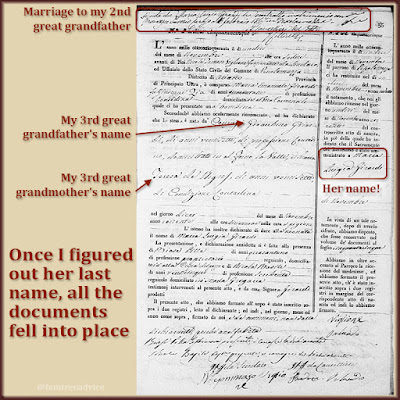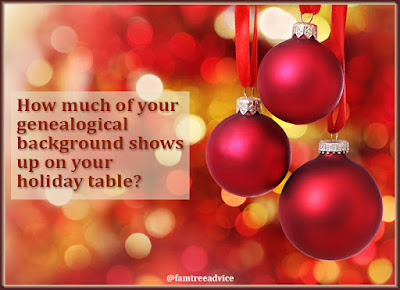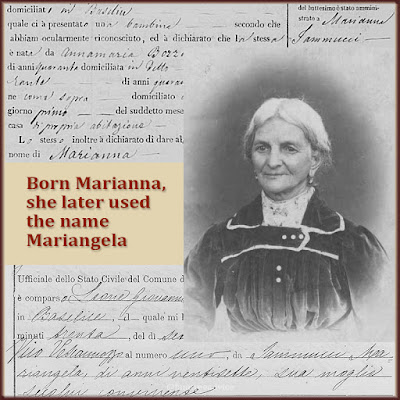Can't read your ancestor's name? Look around. You'll find it somewhere else.
Imagine finding the clue that will lead you to the maiden name of your 4th great grandmother. You're so excited! You can finally break through to another generation!
You found the name of your 3rd great grandfather in a death index. At least, you think it's him. You'll know for sure when you see the death record itself.
The death record should have the name of his wife—your 3rd great grandmother. Seeing her name will confirm that you've got the right death record. You know his father's name already. The only thing you don't know is his mother's full name.
 |
| What happens when you can't read the name?! |
And there it is! You know this is your 3rd great grandfather because his wife's and father's names are what you expected.
Holding your breath, you rest your eyes on the prize: your 4th great grandmother's full maiden name.
WHAT DOES IT SAY? Oh no, you can't read the handwriting at all!
Don't panic. All is not lost. There are a few things you can do to figure out her name. Follow these 5 steps to make sense of that precious name:
1. Make an Educated Guess or Two
Take your best guesses. Write down a few options. You're bound to be pretty sure of some letters and completely unsure of others. What variations of a name can you make using the letters you know and changing the letters you don't know?
2. See What Looks the Same
With these variations in mind, review the entire index. Look at all the entries for any name that looks like the one you need. Go to those documents for another view of the name. Do you think you can rule out or rule in some variations?
3. Expand Your Search
If you don't find any good names, check the index for a few others years. Take a look at all types of documents for the town around this time.
4. Collect More Evidence
Go to Ancestry or FamilySearch and enter your variations of the name, one at a time. Do any variations give good results? If you get results that come from the same town, that's now your #1 guess.
5. Put it to the Test
Search for your top-performing guess in and around your ancestor's town. This may help you find possible relatives. It may even lead to document with a clearly written version of your 4th great grandmother's name.
 |
| My 3rd great grandmother's same didn't make sense…until I found her death record. |
I've had several cases where I finally found a name I needed for so long, only to be unable to read it. There was my 3rd great grandmother, Rufina Zullo. The first time I saw it, I thought it said Cenzullo. In the small town where she lived, there were many people named Cenzullo or Censullo. So I thought Rufina's last name was one of these.
Sound far-fetched? Well, there was another woman in town named Rubina Cenzullo. I was mixing them up without realizing it.
But I kept digging, looking for other mentions of my Rufina. Her 1898 death record finally solved the problem. She came from another town! That's why no one else in this town had her name. When I found her birth record in the other town, I knew once and for all that her name was Rufina Zullo.
 |
| I couldn't break through until I figured out her Anglicized, badly misspelled name. |
My 2nd great grandmother, Maria Luigia Girardi, was another problem. I hadn't been able to find my great grandmother's birth record, so I didn't know her mother Maria Luigia's last name. I kept searching.
It was a death record and an indexed record for my great grandmother's brother that gave me some clues. A transcription of his mother's name was absolutely not Italian. It seemed French: Gerordiu. Then I found my great uncle's death certificate. It Americanized his mother's name to Marie Gerard.
I thought about those 2 variations for a moment. Gerordiu and Gerard. I was thinking, "How can I make that name Italian?" Then it hit me. Girardi!
So I did an Ancestry search for immigration records with the last name Girardi. I tightened up the search by adding in the hometown I needed: Pescolamazza, Italy. I got quite a few results.
Shortly after I decided Girardi was most likely the name, I gained access to vital records from the town. That's when I found out for sure that:
- My great grandmother's mother was Maria Luigia Girardi.
- Maria Luigia was born in Pescolamazza on 10 Nov 1840.
- The Girardi name was in the town at least as far back was the 1760s. That's when my 5th great grandfather Giuseppe Girardi was born.
- I'm not related to baseball manager Joe Girardi. (His family is from northern Italy.)
Get as familiar as possible with the names from your ancestral hometowns. Familiarity is a tremendous help. I spend so much time poring over old vital records from my grandfathers' towns that bad handwriting does not slow me down anymore.
I hope the next time you're totally stuck on a name you'll try these 5 steps to help figure out your ancestor's name. Be sure to see "How to Read Names on Badly Written Vital Records."



